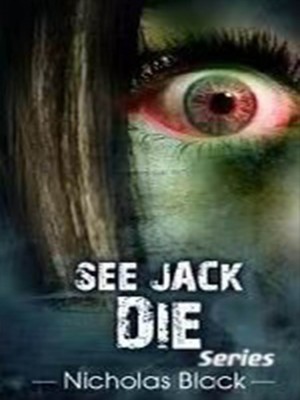
See Jack Die (2 book series)
Jack Pagan might as well be 4½ months old. He awoke in a hospital after suffering a head injury that left him dead for over 67 minutes. All of his longterm memories were destroyed. Now he has to start his life again. But his accidental flirt with death left him a special gift. In those few minutes as he fades off to sleep each night, and in those early hours of the morning as he numbly awakens... he sees them.At first, the shadows would just stretch into strange shapes and forms. Jack thought that he was hallucinating. That his medication was playing with his vision. Then the strange shadows began to walk around, moving freely. Jack chalked it up to a brain tumor. Some disease in his cerebral cortex. Schizophrenia, even. Something he could live with. Now these creatures are not only haunting his nights, but his days. And they have a tendency to show themselves around people who are about to die. Seeking help he turns to a psychic who gives him a very special book. A book that he
21 June, 325 AD . . .
The first ecclesiastical gathering in history, to eventually be known as the Council of Nicaea, was summoned on the day of the summer solstice. Constantine, ruler of Rome, chose this date to celebrate his initiation into the religious order of Sol Invictus, one of the two thriving cults that regarded the Sun as the one and only Supreme God.
It was held in a hall of Osius's Palace, and there were hundreds in attendance. The intention of Constantine, through this convention, was to create an entirely new god for his empire. A god that would unite all religions, and other very vocal and violent factions under one deity.
The factions were diametrically opposed and all argued vigorously for the adoption of their beliefs and their Gods to be a part of this new, unified religion. Throughout these debates the different factions became quite heated as they argued their positions.
Fifty—three gods were tabled for discussion. For 17 months they continued to ballot in order to narrow this list of potential deities. In the end, the list of gods had been voted down to just 5 prospects: Caesar, Mithras, Horus, Drisna, and Zeus.
Constantine, the ruling voice at the Council of Nicaea, had another idea. He proposed a merger of sorts, an amalgamation of the different deities. And this proposal enraged many of the independent factions.
Behind the scenes, while these decisions were being argued and debated vigorously, several religious factions were angered by this process. A secret group was formed to counteract the Council's actions. When the scripture and books were presented that would eventually become the text of the Christian Bible, this secret group had their own scriptures and text. They went beyond the books and Gospels of the bibles we now read.
And the story they told . . . is much darker.
1,685 years later . . .
R.H. Dedman Memorial Hospital, Dallas.
May, 9th . . .
My name is Jack Pagan . . . and I might as well be four months and sixteen days old. I need to tell you about them. I need to prepare you for the monsters.
My name—Jack Pagan—is one that the doctors at the hospital gave me. Jack, because that was a hell of a lot better than John Doe. And my last name—Pagan—well . . . that's because I told those doctors they could keep all of their religious propaganda. Save somebody else. If there is a god, he doesn't seem to be in my corner.
Like when my life disappeared, where was He then? When the first few decades of my existence were snatched away . . . I could have used some faith. I didn't need a big sea splitting miracle. A floating Bible would have been enough. I'd have settled for a toasted Jesus on a grilled—cheese sandwich, even.
But nope.
Just silence.
I don't actually remember what made the darkness come. There's this shrill ringing sound that seems to permanently echo in my head. Like some loud explosion that's stuck bouncing around in my mind, forever. A stagnant memory being replayed, over and over.
Imagine a DVD scratched just right to repeat, and repeat, and repeat the same second in time. An answering machine stuck on one fraction of one message. An anonymous frame in time that I won't be allowed to forget.
It never gets any duller, this sound. And it never leads me any closer to what actually happened. Whatever crashed my hard drive, did it completely. It's like, with that one loud pop, everything else was wiped—out.
These know—it—all doctors, they keep saying how lucky I am to be alive. Massive trauma to the base of my skull which caused,
". . . Localized bilateral lesions in the limbic system, notably in the hippocampus and medial side of the temporal lobe, as well as parts of the thalamus, and their associated connections."
That's doctor talk for messed—up head. They tested me for all kinds of brain disorders and diseases—Cerebral arteriosclerosis
hardening of the brain arteries
, Korsakoff's Syndrome
deficiency of vitamin—B, or Cerebral tumors involving the third ventricle of the brain
, and encephalitis
brain inflammation
.
I was negative on all of those.
Of course, that still doesn’t explain the things I see crawling around.
They, in their white lab coats, with their European sounding names, and their accents, keep telling me that I am a testament to the advances in emergency medicine. They say I'm an example of the breakthroughs in neurosurgery.
They don't know the half of it.
I was told, by the attractive, tall neurosurgeon, that losing my memory was like being reborn. Like I was fresh to the world. I could start over. Do anything I could imagine.
I told her that I liked my old life. Wanted it back.
She smiled one of those knowing, learned smiles, her greenish—grey eyes looking down on me like I was a fool, "But, Mr. Pagan . . . how would you know if you liked your old life? All your long—term memories are gone. Forever." She shrugged, "Those parts of your brain are damaged beyond repair. You can't miss what you can't remember."
And even though she wasn't trying to be mean, there was this condescending undertone to her words that told me I was an idiot. Maybe she didn't mean it. Maybe this was part of her getting me to cope with my new reality. But all I got out of it was, idiot, idiot, idiot.
They take an oath, those doctors, to save everyone . . . even idiots. So then I tell her that, other than my head wound, I feel fine. I explain to her how I want to work on getting my life back. She then corrects me, and I rephrase . . . I want to get my new life started.
And here comes that pity—laden smile again. And she gives me all this fancy talk about how the parts of my brain that hold long—term memories—predominately the mammillary bodies, circumscribed parts of the thalamus, and of the temporal lobe
hippocampus
—how they're destroyed, and will never be repaired. How I'll never remember anything that happened before Christmas Eve of last year. And she emphasizes the word never each time she says it.
"It's all gone, Mr. Pagan. You need to find a way to stop looking for your old life. It doesn't exist anymore. Try to imagine that it never did."
I asked her why I still remembered words and locations on a map. I wondered, if my brain is so messed up, why can I still figure out the area of a square? How do I remember that I like Rocky Road ice cream? How I like the Victoria's Secret models? How I could almost taste a thick crust pizza with pepperonis and mushrooms?
She carefully explained, with her eyes looking down her nose at me, that those things were stored in different parts of my brain. Parts that were still functioning normally. In fact, she said, my brain was performing quite exceptionally . . . considering the trauma that my head had suffered.
I'm tired of this hospital. I'm sick of the food. I don't like the pastel colors that everything is painted—mood calming colors. It's always cold and everybody that works here, from the doctors, to the janitors, are emotionally cold and distant. Like they're waiting for me to die, or leave.
I want to leave.
They want me to leave.
Then she asks me how the classes are coming. Amnesia patients—like myself—have to go to all of these special classes that the hospital offers. I think it's an insurance set—up. Kind of like them hedging their bets if we go loopy. The classes are on different subjects that are supposed to drastically affect our ". . . new life scenarios."
There's a class on Coping.
A class about Nutrition.
One about Anger Management.
A boring set of videos on Post—Traumatic Stress Disorder.
Oh, and a long spiel about the 'Dangers of Prescription Medicine Abuse'. That particular class is good if you're ever thinking about picking up an addiction, because they tell you everything you need to know to get your 'fix'. I learned more about drugs in that class, than most junkies learn in a lifetime.
Anyway, it's all legislated living skills. All of those important things you need to know about life, broken—down, sub—divided, and agreed upon by a board of doctors somewhere in New England—where they really know what it takes to have a productive life.
I told the lady doctor that I liked the classes just fine. That I'd whole—heartedly recommend them to anyone in my position. That they were really helping me put this all into perspective. They like to hear things like that, one of the nurses—a young kid—whispered to me after one of the classes.
I made it clear to the lady doctor that I would soon be ready to start my life anew. And maybe I was selling it too much. A bit overly optimistic. Because there were some things I was leaving out.
She nodded as she scribbled some notes down, asking me about my eating habits. I shrugged. I haven't been so hungry lately. Nothing has much taste. But that could be a commentary on hospital food. She laughed at that.
After all of these questions, she looks at me, like I'm an injured stray puppy. Like I'm cute, but too broken to take home. Her face is thin and symmetrical with a small perfect nose.
"Is there anything else going on that you would like to talk about?" she asks carefully.
And while I'm considering her question, she adds, ". . . anything strange? Anything at all?"
Did I tell her about the shadows?
Did I tell her about the things I see just before I fall asleep and just as I wake—up in those blue minutes near dusk and dawn?
About the screaming that comes from that other place?
Doctors—even fancy, know—it—all, neurospecialists—they don't understand things like that. Heck, I don't understand things like that. But I know that you get a padded cell and a Thorazine drip if you mention creatures crawling around in the darkness. People like me, who talk about the monsters . . . we end up as slobbering pharmaceutical test subjects.
We become numbers.
Lab rats.
So, no. I didn't tell her about any of the things I see lately. And the whole time we're talking, I'm trying not to stare at the dark grey shadow behind the door, that's looking at this lady doctor as if she might just be dinner.
You may also like

The Alpha's Companion
eGlobal Publishing

Just Got Lucky
Ellyreiv

The King's Protector
Eve Cheney



